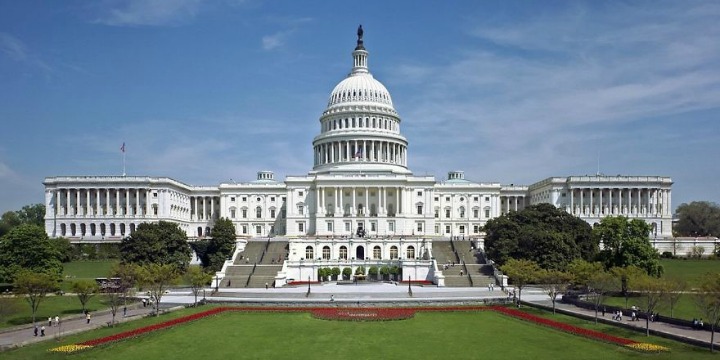American Islamic Group Preaches Tolerance, but Doesn’t Practice It
 by Andrew E. Harrod
by Andrew E. Harrod
Council on American-Islamic Relations (CAIR) leaders have a peculiar way of expressing their oft-preached virtues of inclusion, pluralism, and participation — as evidenced by a recently filmed October 10 CAIR panel on “Anti-Muslim Bias in Politics.” CAIR Government Affairs Director Robert McCaw specifically asked me to leave this “private event” — broadcast online — in an act of censorship that is contrary to its supposed values. If CAIR can’t abide a modicum of political pluralism at a public event, why should anyone believe their platitudes about liberty and equality?
My expulsion was ironic in view of the comments by McCaw and his CAIR colleagues in the Rayburn House Office Building on Capitol Hill during this sparsely attended event. He spoke of “open conversations” in which “we are going to encourage audience members to ask questions.” CAIR’s panel instead presented dubious boilerplate cries of victimization that have filled innumerable similar events. Reading somewhat awkwardly from his smartphone notes, McCaw claimed that “anti-Muslim bigotry inside the United States and Europe has risen consistently over the last two decades,” have “now just become a part of the mainstream American political experience,” and “fit in a larger historical frame of xenophobia and social discord.”
McCaw’s CAIR colleague Zainab Arain similarly condemned an “increasing institutionalization of Islamophobia within the government.” Barzegar’s “esteemed mentor and friend,” Islamist apologist John Esposito, ominously stated that a “tsunami wave” of hate crime violence and legal challenges have hit American mosques, even as mosque construction has boomed in recent decades.
In contrast, Esposito and his fellow panelists dismissed any scrutiny of Islamist threats, and claimed that American concerns over Sharia law were “fabricating an issue.” But statements from CAIR officials and significant Muslim support for Sharia law around the world, including in the United Kingdom, reveal the emptiness of his claim that no American Muslims desire Sharia.
Barzegar attacked Barack Obama’s Countering Violent Extremism (CVE) programs as a “very aggressive securitization and deputization of our entire civil society space.” Even these politically correct approaches to Islamism under the Obama administration displeased him; he claimed that CVE addressed a “manufactured problem.” Barzegar therefore praised as a “victory” the withdrawal of Los Angeles city authorities from CVE programs.
Pleasant-sounding statements by Esposito on confronting “across the board racism” were no more credible. Although McCaw asserted that American Muslims involved in the political process want to “make America great for everyone,” the Anti-Defamation League has documented CAIR’s “anti-Israel agenda.” Not surprisingly, the Hamas-derived CAIR likes “to partner with various anti-Israel groups that seek to isolate and demonize the Jewish State,” including slandering Israel as practicing “apartheid.”
With deceptive cheerfulness, McCaw concluded the panel by offering free tickets to the audience and any congressional staff to CAIR’s annual banquet. CAIR has expressly disinvited this reporter from that event. CAIR’s insular Islamists reserve their charm for useful idiots while excluding serious critics who refuse to play along with their hypocritical, one-sided demands for respect.
Andrew E. Harrod is a Campus Watch Fellow, freelance researcher, and writer who holds a PhD from the Fletcher School of Law and Diplomacy and a JD from George Washington University Law School. He is a fellow with the Lawfare Project. Follow him on Twitter @AEHarrod.
 US Stops UN From Recognizing a Palestinian State Through Membership
US Stops UN From Recognizing a Palestinian State Through Membership Jordan Reaffirms Commitment to Peace With Israel After Iran Attack, Says Ending Treaty Would Hurt Palestinians
Jordan Reaffirms Commitment to Peace With Israel After Iran Attack, Says Ending Treaty Would Hurt Palestinians ‘Crisis at Columbia’: Elite University Spirals Into Chaos Against Backdrop of School President’s DC Testimony
‘Crisis at Columbia’: Elite University Spirals Into Chaos Against Backdrop of School President’s DC Testimony ‘A Time for Vigilance’: FBI Director Says Agency on Alert for Threats Against Jewish Community During Passover
‘A Time for Vigilance’: FBI Director Says Agency on Alert for Threats Against Jewish Community During Passover New Haggadah Released for Israeli Soldiers in Gaza Ahead of Passover
New Haggadah Released for Israeli Soldiers in Gaza Ahead of Passover ADL Data Reveals Alarming Campus Antisemitism, Despite Strong Jewish Life
ADL Data Reveals Alarming Campus Antisemitism, Despite Strong Jewish Life New Hospital Approved for Construction in Southern Israel Amid Gaza War
New Hospital Approved for Construction in Southern Israel Amid Gaza War UN Security Council to Vote Thursday on Palestinian UN Membership
UN Security Council to Vote Thursday on Palestinian UN Membership New Play Opening in NY Recounts Verbatim Testimonies From Oct. 7 Survivors, Families of Victims
New Play Opening in NY Recounts Verbatim Testimonies From Oct. 7 Survivors, Families of Victims




 UN Security Council to Vote Thursday on Palestinian UN Membership
UN Security Council to Vote Thursday on Palestinian UN Membership New Hospital Approved for Construction in Southern Israel Amid Gaza War
New Hospital Approved for Construction in Southern Israel Amid Gaza War ADL Data Reveals Alarming Campus Antisemitism, Despite Strong Jewish Life
ADL Data Reveals Alarming Campus Antisemitism, Despite Strong Jewish Life Iran Could Review ‘Nuclear Doctrine’ Amid Possibility of Israeli Strike, Iranian Commander Warns
Iran Could Review ‘Nuclear Doctrine’ Amid Possibility of Israeli Strike, Iranian Commander Warns New Haggadah Released for Israeli Soldiers in Gaza Ahead of Passover
New Haggadah Released for Israeli Soldiers in Gaza Ahead of Passover